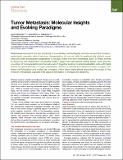Tumor Metastasis: Molecular Insights and Evolving Paradigms
Author(s)
Weinberg, Robert A.; Valastyan, Scott John; Weinberg, Robert A
DownloadValastyan-2011-Tumor Metastasis_ Mo.pdf (1.791Mb)
PUBLISHER_POLICY
Publisher Policy
Article is made available in accordance with the publisher's policy and may be subject to US copyright law. Please refer to the publisher's site for terms of use.
Terms of use
Metadata
Show full item recordAbstract
Metastases represent the end products of a multistep cell-biological process termed the invasion-metastasis cascade, which involves dissemination of cancer cells to anatomically distant organ sites and their subsequent adaptation to foreign tissue microenvironments. Each of these events is driven by the acquisition of genetic and/or epigenetic alterations within tumor cells and the co-option of nonneoplastic stromal cells, which together endow incipient metastatic cells with traits needed to generate macroscopic metastases. Recent advances provide provocative insights into these cell-biological and molecular changes, which have implications regarding the steps of the invasion-metastasis cascade that appear amenable to therapeutic targeting.
Date issued
2011-10Department
Massachusetts Institute of Technology. Department of Biology; Whitehead Institute for Biomedical Research; Ludwig Center for Molecular Oncology (Massachusetts Institute of Technology)Journal
Cell
Publisher
Elsevier
Citation
Valastyan, Scott, and Robert A. Weinberg. “Tumor Metastasis: Molecular Insights and Evolving Paradigms.” Cell 147, no. 2 (October 2011): 275–292. © 2011 Elsevier Inc.
Version: Final published version
ISSN
00928674
1097-4172